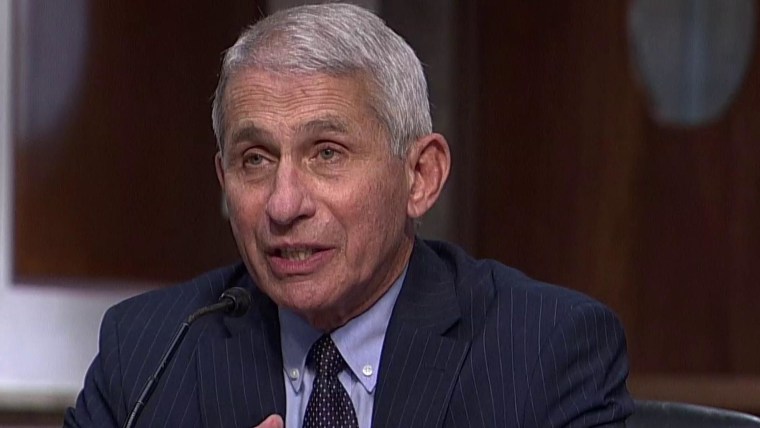Dr. Anthony Fauci, one of the nation’s leading health officials, suggested Tuesday the number of COVID-19 cases diagnosed each day could rise dramatically unless the nation can control the spread of the coronavirus.
“I’m very concerned about what’s going on right now, particularly in the four states that are accounting for about 50 percent of the new infections,” Fauci, the director of the National Institute of Allergy and Infectious Diseases, told the Senate Committee on Health, Education, Labor and Pensions.
Full coverage of the coronavirus outbreak
Those states — Arizona, California, Florida and Texas — are experiencing surges in COVID-19 cases. And at least 12 states are reporting increases in COVID-19 hospitalizations.
“We are now having [40,000+] new cases a day. I would not be surprised if we go up to 100,000 a day if this does not turn around,” Fauci said. “Clearly we are not in total control.” He declined to make a prediction on the number of COVID-19-related deaths the U.S. could experience. More than 126,000 Americans have died from COVID-19, the disease caused by the coronavirus.
“I’m very concerned, because it could get very bad,” he said.
The testimony came during a hearing intended to address how the nation’s schools can safely reopen, even as many cities and states are pausing or reversing plans to open up the economy.
Many new COVID-19 infections are among young adults, and are largely linked to large gatherings.
The coronavirus spreads mainly from person to person through respiratory droplets from coughing, sneezing, talking and singing.
Health officials continue to urge everyone to do their part to control the spread, by washing hands, maintaining physical distance and wearing masks.
Download the NBC News app for full coverage of the coronavirus outbreak
“It is critical that we all take the personal responsibility to slow the transmission of COVID-19, and embrace the universal use of face coverings,” Dr. Robert Redfield, director of the Centers for Disease Control and Prevention, said during his testimony Tuesday.
“Specifically, I’m addressing the younger members of our society, the millennials and Generation Zs,” Redfield said.
Fauci said elected and community leaders should be modeling good public health behavior by wearing masks, a behavior that has become a symbol of political division. President Donald Trump has generally refused to wear a mask in public settings.
Sen. Lamar Alexander, R-Tenn., made a point to encourage the president to wear a face covering. “The stakes are too high for the political debate about pro-Trump, anti-Trump masks to continue,” he said at the hearing.
Follow NBC HEALTH on Twitter & Facebook.













